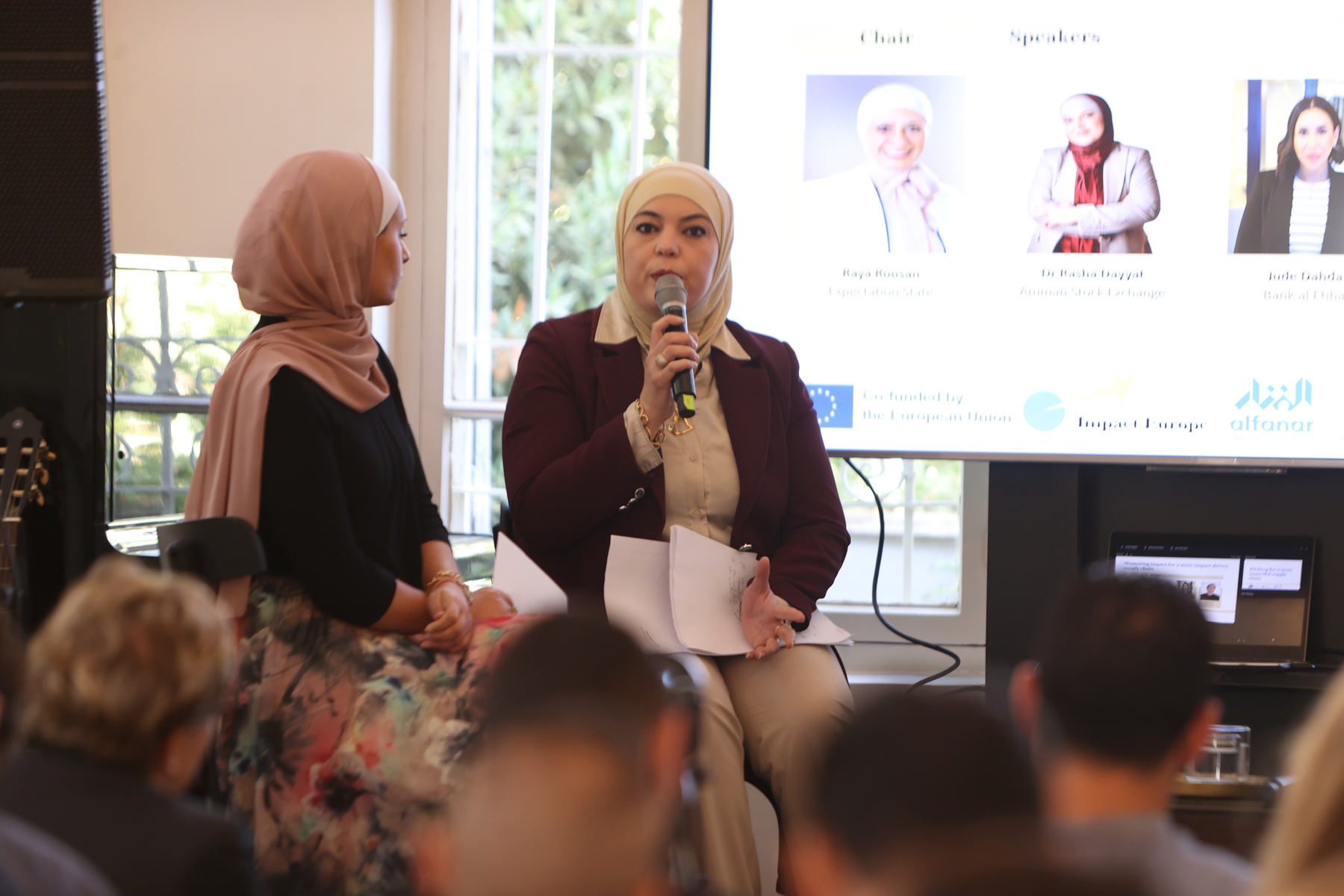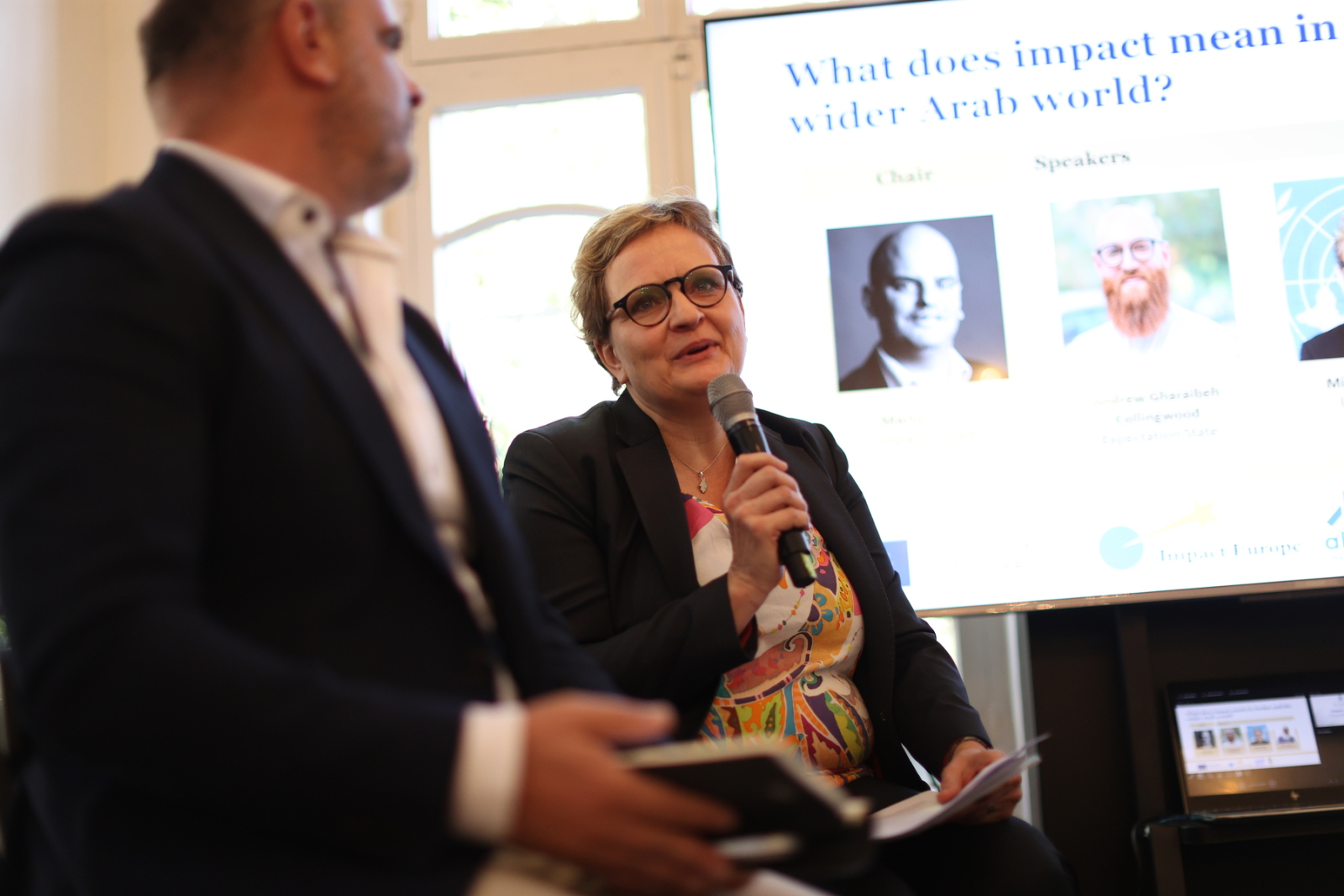How Impact is Patiently Thriving in the Levant
In times of conflict and hardships, social enterprises and the organizations that support them stand tall. It’s a lesson we have learnt throughout our market building efforts in recent years. It is no different in Jordan, where a flock of impact people gathered to forge more collaboration across the MENA-region.

“Connecting for Social Transformation Across the Arab World”. It is an event that almost did not happen at all. Being minfdul of the recent escalations of the conflict that holds the region its grip, the question arose: does it even make sense to do this event now? The answer was a resounding yes – if anything, now is the moment to come together and keep building, said our partners at Alfanar, who organised the one-day gathering.
The regional impact community agreed. A group of around 100 people made their way to the beautiful NOFA Creative Space in Amman to share experiences and create new connections when it comes to accelerating or enabling social impact. The event was set up within the framework of the EU-funded Impact Together project, which unites partners from the MENA-region around this very mission.
Suha Abdul Rahim, Country Director for Jordan and Palestine for Alfanar, kicked the event off with a powerful intro that reflected on the conflict and hardships unfolding in the Levant. She stressed the need for collective action, stating, "We cannot ignore what's happening in the region. We just cannot, and we need to actively be working together and uniting to try and figure out solutions to make this just go away." She also praised the "creativity and innovation" of communities in places like Palestine and Lebanon, highlighting their "determination to come together, to be present and persevere in an anchored common purpose, which is to continue to live a dignified life."
Completing the round of introductions, Dr. Tamam Mango of The Crown Prince Foundation took the microphone. Established in 2015, the foundation focuses on economic participation, leadership, and sustainable community development. Last year, they reached over 2.2 million people across Jordan through different initiatives in these areas.
Their focus is on engaging youth, and that is no coincidence. As Dr. Tamam Mango states, "70% of Jordan's population is under the age of 30. It’s a cliché, but this is both a blessing and an incredible challenge." She continues to state that while Jordan has high rates of startups and engineers per capita, the country also shows signs rising poverty and youth unemployment. Through the creation of different social collaboration structures, the foundation hopes to create a sense of shared purpose around these themes.
Building the top level
And they are not alone in that mission. Impact Jordan, an organization consisting of people from all corners of the impact investing field in the country, is also seeking to create a sense of coherence and urgency around social impact. The first panel discussion focused on their top-level efforts to create a momentum shift as well as a greater awareness of the benefits of financing social enterprises in Jordan.
Michaela Prokop, ex-UNDP Advisor involved with Impact Jordan for the past 6 years, provided historical context. She frames the necessity for an organisation like Impact Jordan within a more general shift in the development finance landscape globally. "Because of the huge financing gaps, new partnerships are required, as well as a shift from funding to financing, as well as a shift towards mobilizing private sector capital at scale." She acknowledged that the MENA region, including Jordan, has been "quite late in realizing or capitalizing on some of the opportunities of these changes." As a result, only 2 percent of impact financing flows towards the MENA region. As such, a large part of Impact Jordan’s operations are focused on building awareness and involving different ecosystem players in working towards the realization of the UNDP SDG’s, which serve as a framework for the organisation’s efforts.

Andrew Collingwood, co-founder of Impact Jordan, helped kickstart the initiative with a report by Expectation State that explored what impact would mean for Jordan. Like all Impact Jordan members, he volunteers his time with Impact Jordan. Collingwood emphasised the absolute need for a national-level body like Impact Jordan to coordinate the impact ecosystem. "This is something that's been taking place in nearly 50 countries across the world, and it's built on the conviction not just in an impact sector, but in any sector, in any initiative, in any idea that you're seeking to build a movement of change, you really need to be organized." For Collingwood, it comes down to the idea of “patiently thriving” – to not fall into the trap of trying to do everything right away, but rather to imagine what comes next and prepare to make that a reality.
Part of ‘what comes next’ in Jordan is sketched by Nesreen Barakat, CEO of the Jordan Strategy Forum and board member of Impact Jordan. She links the ideals and objectives of the organization to Jordan's overall economic modernization vision, which aims to attract $40 billion in investments and create 1 million jobs by 2033. “Sustainability has to be an integral part of this economic modernization vision. This is part of what drives us forward with the Jordan Strategy Forum and with Impact Jordan - to apply that lens of the sustainable development goals, and to fuse those two visions together."
Moving to collective action
So what does that mean in terms of moving towards collective action? How do we get closer to realizing those goals? Firstly, let us take a step back from Jordan and consider a few initiatives in the broader Arabic region. A wide array of panelists hailing from different social economy support organizations gave insight in how they contribute to a healthier impact ecosystem across borders.
One industry branch that boasts great examples in this respect is the green sector. Aline Bussmann, Co-Director, shared how the work of Cewas has evolved over the past 15 years. They are the world’s first organisation focused on supporting impact entrepreneurs in the sector of water and sanitation. Adopting a regional approach has been quintessential to them, Bussman explains. "We took many years to understand what works in the different markets. In Palestine, in Jordan, in Lebanon, in Iraq, what type of business models work in Lebanon but not in Iraq, which type of water solutions by entrepreneurs work in Palestine and not in Jordan." Crucially, it has also meant adopting a long-term perspective that also focuses on the client side, meaning to prepare the market for the solutions offered by their associated entrepreneurs.
Another initiative championing the work of social enterprises is the Lebanese Social Enterprises Association (LSE). For some time, they have been advocating for a legal framework and policy support for social enterprises in Lebanon. As Ayat Said, Project Coordinator at LSE, states clearly, "We want for these social enterprises to be recognized, to have a distinct legal status." Beyond this policy work, LSE has also been supporting its member social enterprises, many of whom have pivoted to provide critical services during the crises in Lebanon. Said highlighted how "social enterprises are really all about sustainability. They really drive economic value and social impact, so they are dynamic, and they need to be supported by NGOs and other organizations."
Tamer Saleh, Managing Director at Beyond Capital echoed this call to action, emphasizing the importance of supporting ventures that have a high level of defensibility and resilience, as "the more it is a real problem, the more it is a necessity, the more it is defensible as a company." From their side, Beyond Capital adopt an ecosystem-enabling approach, supporting entrepreneurs, angel investors, and fund managers through various capacity building programs. A key initiative in this regard is their Italian Fellowship Program, which aims to help aspiring fund managers design and conceptualize their fund models with impact embedded from the start. It is designed with a ripple effect in mind, as the fund managers integrate impact considerations into their investments, ultimately supporting more resilient and impactful social enterprises.
Lead by example
While the organizations above excel in offering support and catalyzing capital and knowledge for impact, more is needed to truly enact impact. This is where other players in the field take over and take pioneering initiatives that are measurable and ideally, scaleable.
Perhaps one of the more striking examples is the engagement of the Amman Stock Exchange. Going beyond its core mission, it has been a driving force in promoting sustainability and impact reporting among listed companies. Rasha Dayyat, Director of the Amman Stock Exchange, explains their approach: "We do not just want to just have corporations publish a report that might be read by some. We need initiatives that have real impact on society, the environment, and specific SDG goals." Under Dayyat’s leadership, the ASE 20 index, which unites the leading companies in Jordan, now requires its constituents to report on their sustainability practices. This rule ensures that sustainability remains visible, not just as a nice-to-have, but as a quintessential building block of responsible business management.
Another leading example is that of Bank al Etihad, which has embedded sustainability as a leading motive throughout the bank's operations. As Jude Dahdal, Sustainability Manager at the bank notes, "Impact is basically supporting startups, supporting youth, supporting SMEs - so supporting the economic development, which at the end leads to the economic development of Jordan as well." The bank has aligned its practices with the Central Bank's green finance strategy, directing more funding towards impactful enterprises.
Of course, real impact is also made by social entrepreneurs themselves. James Lynes, Co-Founder of Bunni Coffee, takes a pragmatic approach to sustainability. He acknowledges that there are some aspects of their business, like importing coffee beans and attending trade shows, that have negative environmental impacts through carbon emissions. However, Lynes is focused on mitigating these negative impacts rather than being overly idealistic. One key example of Bunni Coffee's sustainability efforts is their goal to become carbon neutral within the next two years. To achieve this, they have installed an air catalytic converter at their new facility in Sahab to help process emissions. They are also transitioning to solar power and electric vehicles in the coming year, even experimenting with deliveries through sail boats rather than motorized boats. “We’re really focusing on efficiency, so that the future is bright for everyone", Lynes concludes.
Food for thought
After these panel discussions, the Amman event continued with pitches from various social enterprises, who each presented their own approach to social transformation and sustainable business development. It offered food for thougt for an afternoon filled with conversations, targeted breakout groups and and a final discussion on the role of art and culture in creating impact. Special attention here went to the work of another one of our partners, Build Palestine, and their new fellow The Wonder Cabinet. More on that in another post, at another date.
For now, we hope that this article has given you some insights into what is at play in Jordan. As we continue our mission to help build a (patiently) thriving ecosystem in the MENA-region, we look forward to our next meet-up at Impact Week, where we will feature our MENA-partners (as well as our Eastern European partners) in several sessions.
